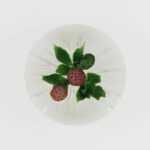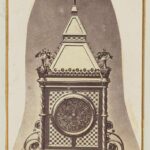In the dim light of an antique shop or nestled among the treasures of a vintage market, the soft glow of uranium glass has a way of capturing attention. This enchanting material, often overlooked amidst the cacophony of more conventional collectibles, beckons enthusiasts and casual admirers alike with its unique charm and historical significance. Known for its striking green hue and dazzling fluorescence under ultraviolet light, uranium glass—also referred to as Vaseline glass—has a story that stretches back to the 1830s. It reflects the intricate dance between artistry and science, a tangible connection to an era that reveled in both innovation and mystique. As we delve into the captivating world of uranium glass vintage, we will explore its origins, craftsmanship, and the enduring fascination it holds for collectors and hobbyists today. Join us as we illuminate the beauty of these radiant relics and uncover the secrets behind their timeless appeal.
Exploring the Allure of Uranium Glass Collectibles
Uranium glass, often referred to as depression glass, dazzles collectors with its vibrant green hue and enchanting glow under ultraviolet light. This unique characteristic is due to the incorporation of uranium oxide during its production, which not only adds a striking visual appeal but also a hint of scientific curiosity. Vintage uranium glass pieces can be found in various forms, including plates, bowls, and vases, often embellished with intricate patterns that capture the artistry of bygone eras. As collectors hunt for these treasures, they delve into a world steeped in history, each piece telling a story of craftsmanship that transcends time.
The allure of uranium glass extends beyond its aesthetics; it holds a unique place in the hearts of enthusiasts for its magical luminescence and the thrill of discovery. Collectors often seek out rarities, such as marked items or those featuring unique iridescent finishes. The community is passionate, with conventions and online forums dedicated to the appreciation and trading of these glowing wares. Here are a few factors that contribute to the excitement of gathering uranium glass collectibles:Vintage Manolo BlahniksVintage Bondage Videos
- Historical Significance: Many pieces date back to the late 19th and early 20th centuries.
- Varied Styles: From Art Deco to Victorian, the design options are diverse.
- Glow Factor: The vibrant glow under UV light provides a playful interaction for collectors.
- Community Engagement: A thriving network of enthusiasts and collectors.
Understanding the Unique Properties of Uranium Glass
Uranium glass, often referred to as Vaseline glass due to its distinctive yellow-green hue, possesses unique properties that intrigue collectors and glass enthusiasts alike. This fascinating material contains trace amounts of uranium, which not only contributes to its color but also grants the glass its characteristic fluorescence under ultraviolet light. When exposed to UV light, uranium glass emits a captivating glow, making it a popular choice for collectors who appreciate the beauty and allure of both antique and vintage items. The incorporation of uranium into the glass also imparts certain characteristics that distinguish it from other types of glass, such as:
- Fluorescence: Glows under UV light, enhancing its aesthetic appeal.
- Radioluminescence: Emits a faint radiation detectable with sensitive instruments.
- Color Variability: Displays a range of shades, from pale yellow to deep amber.
- Historic Significance: Represents a unique chapter in glassmaking history, particularly during the Victorian era.
The manufacturing process of uranium glass evolved throughout the years, with notable variations in its composition and appearance. One such notable aspect is the differentiation in the uranium content used by various manufacturers and eras, leading to distinctions in both the glass’s aesthetic and its radioactivity levels. The following table summarizes key features of uranium glass types based on their era:
| Era | Color | Uranium Content |
|---|---|---|
| Victorian (1837-1901) | Pale Yellow to Green | High |
| Art Deco (1920s-1930s) | Bright Green | Medium |
| Mid-Century (1940s-1960s) | Deep Amber | Low |
Caring for Your Uranium Glass: Best Practices for Preservation
Caring for your uranium glass is essential to ensure its longevity and maintain its striking visual appeal. Here are some key practices to keep your collection in excellent condition:
- Gentle Cleaning: Use a mild detergent mixed with water and a soft cloth or sponge. Avoid abrasive cleaners and scrub brushes, as they can scratch the surface.
- Display Considerations: Keep your pieces away from direct sunlight and extreme temperature fluctuations to prevent discoloration and cracking.
- Storage Solutions: If not displayed, store your uranium glass in padded boxes or on soft shelves to protect against accidental impacts.
- Regular Checks: Periodically inspect your collection for chips or cracks, and consider using UV glass display cases for additional protection.
When it comes to storing and displaying uranium glass, the right environment makes all the difference. Here’s a quick reference table showcasing ideal conditions:
| Condition | Recommendation |
|---|---|
| Temperature | Stable, between 60°F and 75°F (15°C – 24°C) |
| Humidity | Low to moderate, ideally around 40-50% |
| Light Exposure | Avoid direct sunlight; use protective display cases |
| Handling | Wear gloves when necessary to avoid oils from hands |
Identifying Authentic Uranium Glass in the Marketplace
When navigating the vibrant world of vintage uranium glass, authenticity is key. Collectors and enthusiasts alike should be well-versed in certain indicators that can help distinguish genuine pieces from contemporary imitations. One of the most reliable methods involves examining the glass under a UV light; authentic uranium glass will fluoresce a bright greenish hue due to the presence of uranium oxide in its composition. Additionally, consider the age and style of the piece. Most authentic items date back to the late 19th and mid-20th century, characterized by their unique designs and craftsmanship. Look out for clear markings or labels that indicate the manufacturer, as these can provide essential context regarding the piece’s origin.
Understanding the production techniques of uranium glass can also enhance your ability to identify authentic items. Here are a few notable characteristics to keep in mind:
- Color: Authentic uranium glass often presents a stunning translucent green or yellow glow.
- Weight: Due to its density, genuine pieces tend to feel heavier than modern glass.
- Air Bubbles: Vintage pieces may exhibit small air bubbles or imperfections, common in handblown glass.
To further illustrate the distinctions, consider this comparison table of common uranium glass attributes:
| Feature | Authentic Uranium Glass | Modern Imitations |
|---|---|---|
| Fluorescence | Strong green glow under UV light | Limited or no fluorescence |
| Markings | Often embossed or labeled | Usually plain or generic |
| Craftsmanship | Handcrafted with unique designs | Mass-produced with uniform aesthetics |
Decorating with Uranium Glass: Tips for Stylish Integration
Navigating the World of Uranium Glass Auctions and Sales
Exploring the realm of uranium glass auctions and sales is both thrilling and intricate. This vibrant glassware, known for its stunning green glow under UV light, has captured the hearts of collectors worldwide. To navigate this captivating market, it’s essential to familiarize yourself with various platforms and venues where these treasures are available. From online auctions to estate sales, you can often find unique pieces, including vases, plates, and decorative items. Participating in auctions requires a discerning eye; be sure to research the provenance of pieces, as descriptions and images can vary widely among sellers.
When it comes to bidding, consider key factors that might influence the value of uranium glass, such as condition, rarity, and color intensity. Take advantage of bidding previews and live sales to understand market trends and prices. Here are a few tips to enhance your auction experience:
- Join Collector Groups: Connect with fellow enthusiasts to share insights and market knowledge.
- Set a Budget: Know your limits before entering a bidding war to avoid overspending.
- Examine Glassware: Whenever possible, inspect items closely for chips or repairs that could affect value.
| Item Type | Average Price Range |
|---|---|
| Vases | $30 - $250 |
| Bowls | $20 – $150 |
| Plates | $15 – $100 |
| Figurines | $50 – $300 |
Q&A
Q&A: Discovering the Allure of Uranium Glass Vintage
Q1: What exactly is uranium glass?
A: Uranium glass, also known as Vaseline glass, is a fascinating type of glassware that contains a small amount of uranium, which gives it its distinctive green or yellow hue. This glass became popular from the mid-1800s to the 1940s, appreciated both for its aesthetic appeal and its unique ability to fluoresce under ultraviolet light.
Q2: How did uranium come to be used in glassmaking?
A: The use of uranium in glassmaking dates back to the early 19th century. Initially, it was incorporated as a colorant, with glassmakers discovering that it imparts a beautiful, vibrant color to their creations. As the industrial revolution spurred advancements in glass production, uranium glass became increasingly popular.
Q3: Is uranium glass safe to own?
A: Yes, uranium glass is generally considered safe for display and use. The amount of uranium found in these pieces is quite low, and the radiation levels are minimal—typically much lower than that of many household items. However, it’s wise to handle it with standard care, especially if you plan to use it for food or drink.
Q4: How can I identify uranium glass?
A: Identifying uranium glass can be a delightful endeavor for collectors. A simple and fun method is to use a black light; true uranium glass will glow a bright green under UV light due to the uranium content. Additionally, examining the piece for characteristics such as smooth lines, a glossy finish, and slight imperfections can also help in identification.
Q5: What types of uranium glass are popular among collectors?
A: Collectors often seek out a variety of shapes and styles, from elegant serving dishes and intricate decorative pieces to everyday items like cups and plates. Some notable types include Depression glass, which is more utilitarian, and the intricately designed Art Deco pieces that boast more artistic flourishes.
Q6: How can I care for uranium glass vintage items?
A: Caring for uranium glass is relatively straightforward. Hand washing with mild soapy water is recommended; avoid using the dishwasher or harsh chemicals, as they could damage the glass. When it comes to storage, keep pieces away from direct sunlight for prolonged periods to prevent fading and deterioration.
Q7: What makes uranium glass appealing to vintage enthusiasts?
A: The charm of uranium glass lies in its unique combination of beauty, historical significance, and the thrill of collecting something with a bit of mystique. The glow that gives it a playful edge, coupled with its vintage provenance, captivates both seasoned collectors and curious novices alike.
Q8: Can you tell us about the current trends in uranium glass collecting?
A: The collecting community has seen a resurgence of interest in uranium glass, spurred by social media platforms and vintage markets. Modern collectors appreciate not just the aesthetic qualities but also the cultural history behind these pieces. As sustainability becomes a key focus, many are drawn to the idea of reusing and preserving vintage artifacts, which adds to uranium glass’s appeal.
Q9: Are there any myths or misconceptions about uranium glass?
A: Indeed, one common myth is that uranium glass is highly radioactive or dangerous, which is not true for typical vintage pieces. While it does emit low levels of radiation, they are far from harmful. Another misconception is that all vintage glass is uranium glass; in fact, there are many other types that do not contain uranium and have their own unique histories.
Q10: Where can one find and purchase uranium glass?
A: Uranium glass can often be found in antique shops, estate sales, flea markets, and online auction sites. Many collectors also frequent specialized glass shows and swap meets, where enthusiasts can trade insights and enhance their collections. Just remember to research and verify the authenticity of pieces before making a purchase.
Conclusion: Whether you’re an avid collector or a casual admirer, uranium glass vintage pieces tell stories that transcend generations, inviting all who encounter them to appreciate their shimmering beauty and richly textured history.
The Conclusion
As we draw the curtain on our exploration of uranium glass vintage, we find ourselves captivated by the unique charm and historical significance of these luminescent treasures. Each piece tells a story, not just of artistry and craftsmanship but also of the remarkable era when they were produced—an era that celebrated innovation while walking the fine line between beauty and science. Whether displayed on a shelf, used as statement pieces in your décor, or cherished within a collection, uranium glass connects us to a rich tapestry of cultural heritage.
While the allure of its vibrant glow ignites our curiosity, it’s essential to approach uranium glass with both appreciation and understanding. As we cherish the past, let us also respect the responsibilities that come with collecting items imbued with history. So, whether you are a seasoned collector or a newcomer drawn in by the ethereal beauty of these artifacts, remember that every piece of uranium glass vintage is more than just a relic; it’s a portal to a time gone by, inviting us to appreciate the artistry and science that continues to shine brightly through the ages.


